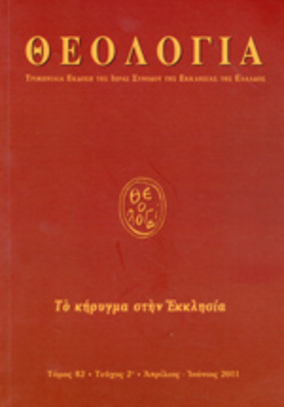Η θεολογία του Albrecht Ritschl (1822-1889)
Part of : Θεολογία : τριμηνιαία έκδοση της Ιεράς Συνόδου της Εκκλησίας της Ελλάδος ; Vol.40, No.1-4, 1969, pages 437-457
Issue:
Pages:
437-457
Parallel Title:
The theology of Albrecht Ritschl
Author:
Abstract:
In this article, the author deals with the Theology of A. Ritschl, (1822-1889), because «the experience derived from the various attempts which have been made within protestantism to make Theology contermporary, despite the differences between Orthodox and Protestants, is unquestionably didactic.» Ritschl began with the Hegelian Theological School of Tübingen, but later left it to become its chief opponent. Ritschl points out the essential unity of the Apostles with Christ and depicts the ancient Church as a development of the religion of the Gentile Christians of the early Church and underlines the importance that history has for Theology. He turned as much against the rationalism of the Tübingen School as he did against Protestant scholasticism which was undergoing a revival during the nineteenth century, as well as against pietism and the romanticism of Schleiermacher. His most important work as a systematic theologian is «The Doctrine of Justification and Reconciliation,» 3 vol's, 1870-74, 1889. As a systematic theologian, Ritschl was a Kantian and emphasized the moral element in the content of religious life. «He tried to modernize orthodox Protestantism by setting for it such goals as those for which Christianity strives even today, as it did during Ritschl time.» Thus he pointed out the significance which both experience and history have for Theology. «Ritschl is the theologian who, more than any of his contemporaries, demonstrated that Christianity is the intersecting point of historical and personal experience.» His Gnosiology: Following Kant, he believes that God's existence cannot be proved by philosophy. «God constitutes the necessary presupposition of practical reason.» «History also contributes to his theological gnosiology.» In the historical personality of Jesus, history finds its criterion and discovers its meaning,» in antithesis to an antihistorical theology with scholastic tendencies. He desires that his gnosiology be based solely upon Scripture and not upon philosophy. We know of God's existence and nature only from the value that they have for us. His teaching concerning God: a) Proofs of God's existence: He believes that the ideas of a first cause and a final goal cannot supercede the limits of the idea of the world. Consequently these concepts cannot express the Christian idea of God. Thus, he rejects the cosmological proof of initial cause as well as Aristotelian logic. He also raises serious doubts about Anselm of Canterbury's ontological argumentation as well as Kant's moral evidence which he corrects. «The spirit in relation to nature is recognized through practical laws which express the fact that the spirit is and end in itself.» According to Ritschl, one is thus led to the conclusion that the Christian idea of God is necessary. Its starting point is the self - evident truth which lies within man's inner experience. «He wants to say that man, experiencing a certain freedom over nature and the world finds the basis of this freedom in Divine Will which has created the world of spiritual life as it final goal,» and thus he considers faith and knowledge of equal validity. b) God as a person: The idea of God as a person is to be found within the essence of religion. God is experienced and lived as a will; within the Christian religion, as a loving will. c) God as love: God reveals Himself in the Son and in the Community as a loving will. «The idea of love is the only one suitable and fitting for God. «The triune God is Divine Will which insures for the faithful spiritual dominion of the world and complete ethical and moral communion in the Kingdom of God. «Ritschl closely connects God's essence with the purpose of the world, 'thus threatening God's transcendency'.»
Subject:
Subject (LC):




